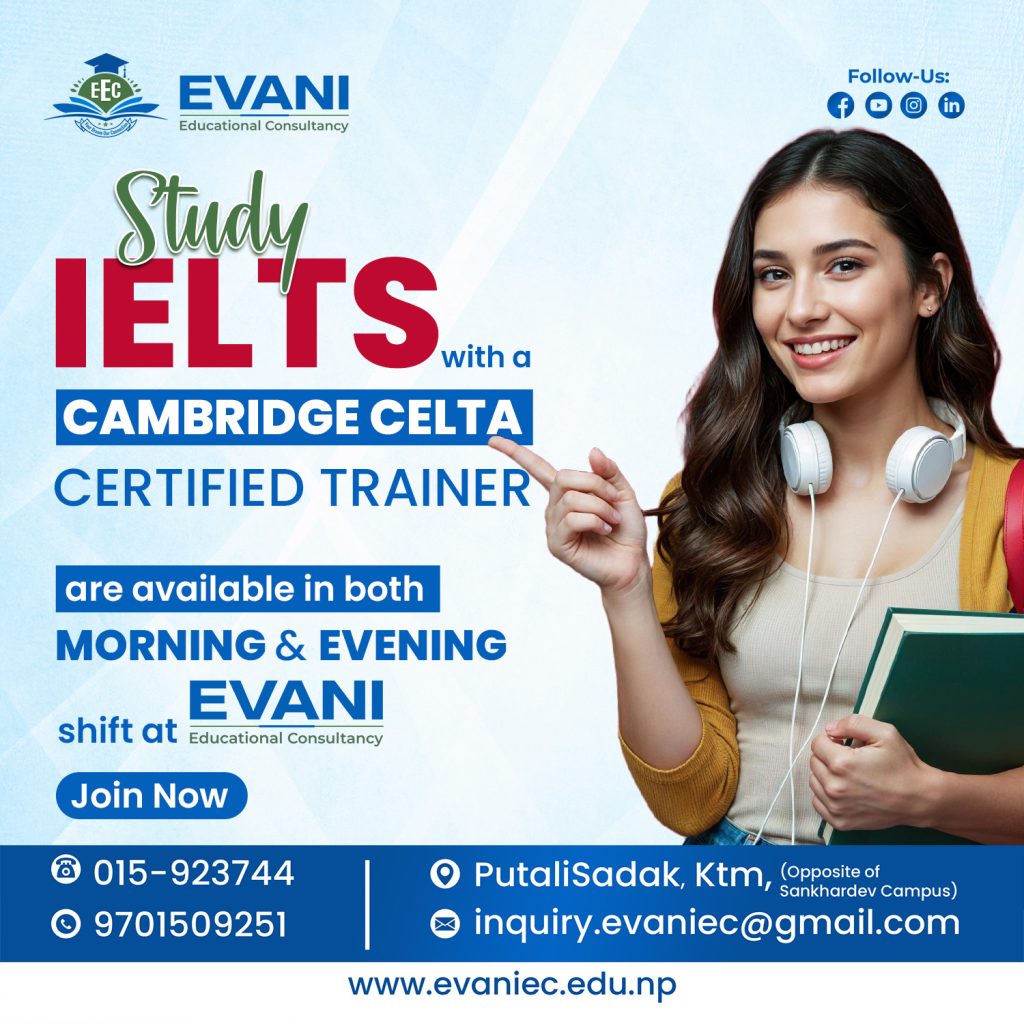Evani Educational Consultancy offers the best IELTS preparation class in Kathmandu, Nepal, combining expert instruction, proven strategies, and personalized support. With Cambridge CELTA certified trainers, we ensure students receive globally recognized teaching standards tailored for IELTS success.
Located at a prime and easily accessible location, we offer flexible morning and evening shifts to fit your routine. Our commitment to small batch sizes allows focused attention, while free regular mock tests every Saturday ensure you’re always exam-ready.
Choose Evani Educational Consultancy for your IELTS preparation in Kathmandu and experience results-driven training, professional guidance, and a smooth path toward your study or migration goals.
Choosing the right institute can make all the difference in your IELTS journey. At Evani Educational Consultancy, we offer a focused, results-driven environment with features that set us apart from other IELTS preparation classes making us the best IELTS institute in Kathmandu, Nepal .
Our classes are led by Cambridge CELTA-certified tutors, an international gold standard in English language teaching qualifications. This ensures you’re learning from instructors trained in effective, learner-centered teaching methods. With expert guidance, our students consistently see score improvements in all four test components.
Evani Educational Consultancy offers free full-length mock tests every Saturday under real exam conditions. These regular practice sessions help you build stamina, identify your weak areas and improve them, and get familiar with the actual test format, giving you a clear edge on test day.
We understand that many students and working professionals juggle busy schedules. That’s why we offer flexible class timings, including morning and evening shifts, so you can study without sacrificing your job, college, or personal responsibilities.
At Evani, you’ll have access to a wide range of updated IELTS materials including books, listening resources, practice tests, and writing correction support. Our in-house study guides and targeted exercises ensure you practice smarter, not just harder.
The International English Language Testing System (IELTS) is a globally recognized English language proficiency test designed for study, work, and migration. It evaluates English skills across listening, reading, writing, and speaking. Over 11,000 institutions in 140+ countries accept IELTS, making it a vital credential for non-native English speakers.
There are three main types of IELTS tests,IELTS Academic, IELTS General Training, IELTS for UKVI, each designed for a specific purpose, whether you’re planning to study, migrate, or work in an English-speaking country.
The IELTS test assesses your English language proficiency across four essential skills: Listening, Reading, Writing, and Speaking. While the Listening and Speaking sections are the same for both Academic and General Training modules, the Reading and Writing sections vary slightly. Here is a detailed breakdown of each section.
The IELTS test is available in three formats,computer based, paper based, and online, designed to suit different preferences and circumstances. While the test content remains consistent across formats, the delivery method, result timelines, and acceptance for visa purposes may vary.
IELTS scores are reported on a 9-band scale, reflecting levels of English proficiency from non-user to expert. Each section, Listening, Reading, Writing, and Speaking, is graded separately, and the overall band score is the average of these four.
Band Score | Skill Level | Description |
9 | Expert user | Fully operational command of English; accurate, fluent, and well understood. |
8 | Very good user | Fully operational with occasional inaccuracies; handles complex language well. |
7 | Good user | Generally effective; occasional errors; good handling of complex language. |
6 | Competent user | Effective communication despite some inaccuracies; understands overall meaning. |
5 | Modest user | Partial command; copes with overall meaning but frequent mistakes occur. |
4 | Limited user | Basic competence limited to familiar situations; frequent problems in usage. |
3 | Extremely limited user | Conveys and understands only general meaning in very familiar situations. |
2 | Intermittent user | Great difficulty understanding spoken and written English. |
1 | Non-user | No real ability to use the language except a few isolated words. |
0 | Did not attempt the test | No assessable information; did not answer the questions. |

FAQ

Students need academic transcripts, an English proficiency test score (IELTS/PTE/TOEFL), a Statement of Purpose (SOP), a Letter of Recommendation (LOR), and a valid passport. Additional documents may be required depending on the country and university.
The best country depends on career goals and budget. Australia offers strong post-study work opportunities, the UK has world-renowned universities, New Zealand provides affordable education with PR options, and Japan is ideal for technology and scholarship opportunities.
Most universities require IELTS or PTE scores. Diploma programs generally need IELTS 5.5 (each band) or PTE 42+, while bachelor's and master's programs may require IELTS 6.0–7.0 or PTE 50–65+.
Yes, some universities accept alternative qualifications or offer foundation programs. However, an English proficiency test is usually required for a student visa.
Students must show proof of funds covering tuition fees and living expenses. The amount varies by country; for example, Australia requires AUD 24,505 per year for living expenses, while New Zealand requires NZD 20,000.
Processing times vary; for Australia, it takes 4–12 weeks, the UK takes 3–6 weeks, and New Zealand may take 2–3 months. Early application is recommended to avoid delays.
Yes, most countries allow students to work part-time. Australia and New Zealand permit 20 hours per week during study periods, while the UK allows 10–20 hours, depending on the course level.
Subscribe to Us for More latest Update
© 2025 Evani Educational consultancy